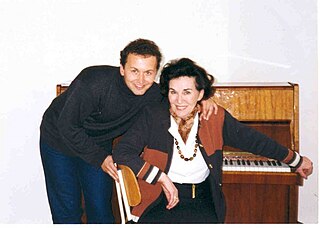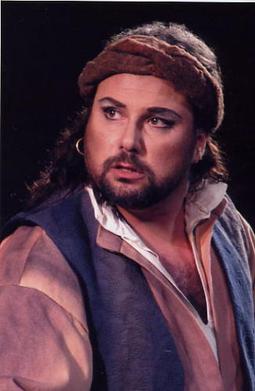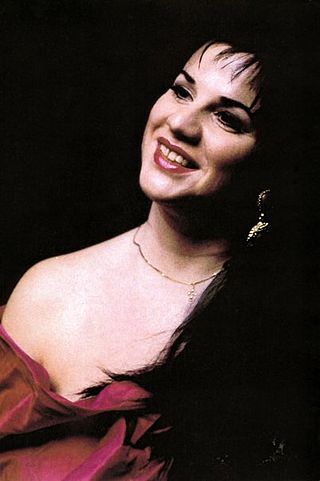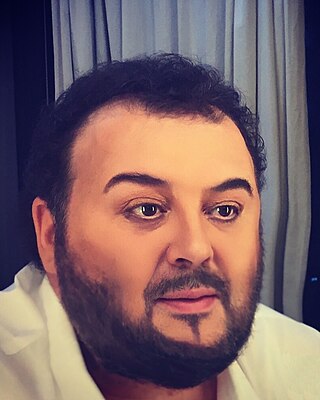
Alexandru Agache (born 16 August 1955) is a Romanian-Hungarian [1] operatic baritone who has had an active international career since 1979. Possessing a powerful and flexible voice, he has drawn particular acclaim in the operas of Giuseppe Verdi.

Alexandru Agache (born 16 August 1955) is a Romanian-Hungarian [1] operatic baritone who has had an active international career since 1979. Possessing a powerful and flexible voice, he has drawn particular acclaim in the operas of Giuseppe Verdi.
Born in Cluj, Agache was trained at the Cluj Conservatory. He made his professional opera debut in 1979 at the Cluj-Napoca Romanian National Opera as Silvano in Giuseppe Verdi's Un ballo in maschera . He was active at that house throughout the 1980s, singing roles like the Count di Luna in Verdi's Il trovatore , Germont in Verdi's La traviata , Iago in Verdi's Otello , Malatesta in Gaetano Donizetti's Don Pasquale , Posa in Verdi's Don Carlos , Sharpless in Giacomo Puccini's Madama Butterfly , Schaunard in Puccini's La bohème , and the title roles in Wolfgang Amadeus Mozart's Don Giovanni and Verdi's Nabucco . [2]
In 1987, Agache toured to Tokyo, Japan with the Berlin State Opera where he performed the role of Count Almaviva in Mozart's The Marriage of Figaro . In 1988, he made his debut at the Royal Opera House in London as Renato in Un ballo in maschera . He has since returned there as Amonasro in Verdi's Aida , Enrico Ashton in Donizetti's Lucia di Lammermoor , the Miller in Verdi's Luisa Miller , and in the title roles of Verdi's Rigoletto and Verdi's Simon Boccanegra . In 1989, he made his debut at La Scala in Milan as Belcore in Donizetti's L'elisir d'amore . In 1992, he made his United States debut at the Houston Grand Opera as the Count di Luna. In 1999, he made his debut at the Metropolitan Opera as Simon Boccanegra with Karita Mattila as Amelia, Plácido Domingo as Adorno, and James Levine conducting. In 2000, he made his debut at the Arena di Verona Festival as Don Alvaro in Verdi's La forza del destino . He has also sung leading roles as a guest artist at the Ankara Opera House, the Bavarian State Opera, the Grand Théâtre de Genève, the Hamburg State Opera, the Hungarian State Opera House, the Lyric Opera of Chicago, the Paris Opera, the Semperoper, the Teatro Colón, and the Vienna State Opera among others. [3]
A baritone is a type of classical male singing voice whose vocal range lies between the bass and the tenor voice-types. It is the most common male voice. The term originates from the Greek βαρύτονος (barýtonos), meaning "heavy sounding". Composers typically write music for this voice in the range from the second F below middle C to the F above middle C (i.e. F2–F4) in choral music, and from the second G below middle C to the G above middle C (G2 to G4) in operatic music, but the range can extend at either end. Subtypes of baritone include the baryton-Martin baritone (light baritone), lyric baritone, Kavalierbariton, Verdi baritone, dramatic baritone, baryton-noble baritone, and the bass-baritone.

Katiuscia Maria Stella "Katia" Ricciarelli is an Italian soprano and actress.

Giuseppe Patanè was an Italian opera conductor.

Maria Antonietta Stella was an Italian operatic soprano, and one of the most prominent Italian spinto sopranos of the 1950s and 1960s. She made her debut in Spoleto in 1950, as Leonora in Verdi's Il trovatore, a year later at Rome Opera, as Leonora in La forza del destino, in 1954 at La Scala in Milan, as Desdemona in Otello, in 1955 at the Royal Opera House in London as Aida, and in 1956 at the Metropolitan Opera in New York City, in the same role.

Ramón Vargas is a Mexican operatic tenor. Since his debut in the early '90s, he has developed to become one of the most acclaimed tenors of the 21st century. Known for his most expressive and agile lyric tenor voice, he is especially successful in the bel canto repertoire.

Radmila Bakočević, is a Serbian operatic soprano who had a major international opera career that began in 1955 and ended upon her retirement from the stage in 2004. During her career, she sang at most of the world's important opera houses, including performances throughout Europe, North and South America. She forged important long-term artistic partnerships with two opera houses during her career: the National Theatre in Belgrade and the Vienna State Opera.

Giuseppe Valdengo was an Italian operatic baritone. Opera News said that, "Although his timbre lacked the innate beauty of some of his baritone contemporaries, Valdengo's performances were invariably satisfying — bold and assured in attack but scrupulously musical."

Karl Gustaf Ingvar Wixell was a Swedish baritone who had an active international career in operas and concerts from 1955 to 2003. He mostly sang roles from the Italian repertory, and, according to The New York Times, "was best known for his steady-toned, riveting portrayals of the major baritone roles of Giuseppe Verdi — among them Rigoletto, Simon Boccanegra, Amonasro in Aida, and Germont in La traviata".
Rico Saccani is a conductor who served as music director and artistic adviser of the Budapest Philharmonic Orchestra between 1996 and 2005 and was principal guest conductor of the Hungarian State Opera from 1985 to 2005.

Mario Petri was an Italian operatic bass-baritone particularly associated with Mozart and Rossini roles.

Carlo Colombara is an Italian operatic bass. He has sung leading roles in major opera houses including La Scala in Milan, the Vienna State Opera; the Real Teatro di San Carlo in Naples, the Arena di Verona, the Royal Opera House in London, and the Metropolitan Opera in New York City.

Vincenzo La Scola was an Italian tenor who had a successful international opera career for more than 25 years. He was particularly admired for his portrayals in operas by Giuseppe Verdi, Giacomo Puccini, Gaetano Donizetti, and Vincenzo Bellini. He also achieved success as a crossover artist, particularly in his many collaborations with singer-songwriter Cliff Richard and for his solo crossover album for EMI, Vita Mia (1999). In 2000 he was made a UNICEF Goodwill Ambassador, and from 2004 until his sudden death in 2011 he served as principal teacher and artistic director of the Accademia Verdi Toscanini in Parma.

Carlo Meliciani was an Italian operatic baritone who had an active international career from the mid-1950s through the late 1970s.

Maria Dragoni is an Italian operatic soprano active international career in major opera house from 1984 to present.
Željko Lučić, is a Serbian operatic baritone who has had an active international career since 1993. He was a member of the Serbian National Theatre in Novi Sad from 1993 to 1998 and at the Frankfurt Opera from 1998 to 2008. He is particularly well known for his performances in the operas of Giuseppe Verdi; having portrayed a total of 23 leading roles from the great composer's works.

Giovanni Meoni is an Italian operatic baritone.
Ștefan Pop is a Romanian operatic tenor. He is considered among today's leading lyric tenors and he is best known for bel canto repertoire. He has won several prizes including, in 2010, Plácido Domingo's Operalia competition and the Seoul International Music Competition.

Fabio Sartori is an Italian operatic tenor. He is particularly known for his interpretations of Italian roles by Giuseppe Verdi, Giacomo Puccini and of the Verismo.
Silvano Carroli was an Italian baritone.

Luca Salsi is an Italian operatic baritone, who is known for portraying characters in Giuseppe Verdi's operas at leading opera houses internationally. He was recognised by the international press in April 2015 when he not only stepped in on short notice at the Metropolitan Opera in an afternoon performance of Verdi's Ernani, but also performed the same evening in Donizetti's Lucia di Lammermoor as planned. Salsi opened four seasons at La Scala in Milan.